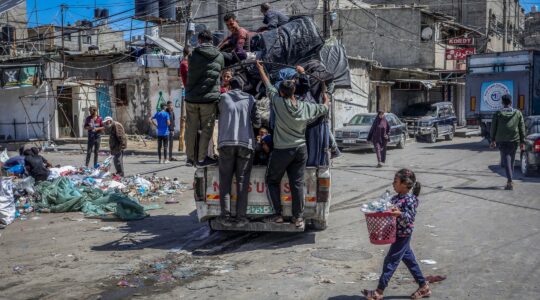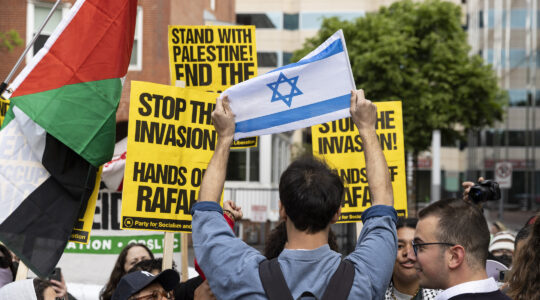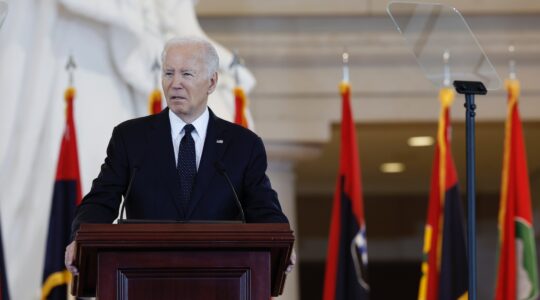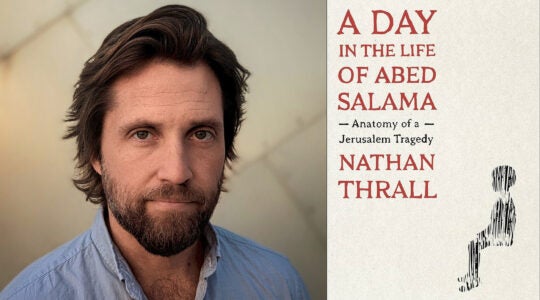WASHINGTON (JTA) – Americans who were victims of terrorist attacks in Israel are pushing back against reported Bush administration plans to intervene in successful lawsuits against the Palestinian Authority.
Families of those who died or were wounded in attacks lobbied lawmakers on Capitol Hill this week ahead of a planned meeting Wednesday with top officials of the State and Justice departments. Two of the families’ cases have gone to judgement.
Sources say the Bush administration is leaning toward asking a court not to grant the victims hundreds of millions of dollars they won in court rulings in recent years.The rulings were based on a number of laws passed by Congress allowing Americans to sue foreign states and entities that enable terrorist attacks.
Sources familiar with the case said the U.S. government was ready to decide in favor of the Palestinian Authority late last month, but delayed until the end of February in part to hear pleas from the families.
The cash-strapped Palestinian Authority has pressed the Bush administration to intervene for more than a year, arguing that crippling lawsuits would hamper its efforts to resist extremists and make peace with Israel.
U.S. officials resisted the request but in December; a federal judge asked the government for an opinion, leading the government to consider the P.A.’s appeal.
State Department and White House officials did not return calls for comment. A Justice Department official would only confirm that the Wednesday meeting was taking place.
The Washington Post quoted a State Department spokesman Tuesday saying that no decision had been made on whether to intervene.
Afif Safieh, the Palestine Liberation Organization representative in Washington, told the newspaper that there was “a rethinking in the State Department that I wholeheartedly welcome.” The suits, he added, were “politically and ideologically motivated.”
Reached Tuesday by JTA, Safieh said he had nothing to add. He is due to leave his post in May.
“The affairs are in the hands of different legal firms,” he said.
The families involved said they were shocked by the news that the Bush administration was ready to intervene.
“I was shocked and frustrated,” said Leslye Knox, who has struggled to raise six children after terrorists fatally shot their father, Aharon Ellis, and four others at a Hadera bat mitzvah celebration in 2002. “My feeling is that Congress passed a law to have an avenue to pursue justice and to make the terrorists accountable for what they have done to our families.”
A U.S. federal court in December ordered the Palestinian Authority to pay $174 million to Knox and her family, members of the Black Hebrews sect. She is raising her family near Atlanta.
Knox was in Washington with her son and Ellis’ parents, who live in Chicago.
Representatives of the families said they did not want to reveal which congressional offices they were visiting because of the sensitivity of opposing the Bush administration.
However, Sens. Charles Grassley (R-Iowa) and Sam Brownback (R-Kan.) are known to have pressed Michael Mukasey, the U.S. attorney general, on the issue.
Mark Sokolow, his wife and two daughters suffered injuries in a bomb blast not far from their hotel in west Jerusalem in 2002. The New York lawyer said government intervention was undue interference in the judicial system.
“There’s a system in America for seeking monetary damages when someone has injured you,” he told JTA. “If the funds are available and the judicial system says the plaintiffs are entitled, we should get them.”
Dr. Richard Blutstein, a physician in Harrisburg, Pa., was taking patients Tuesday afternoon and then driving with his wife, despite the forecast of snow, to make the meetings on Wednesday. His son, Benjamin, was killed in July 2002 in the Hebrew University cafeteria bomb blast.
Blutstein noted that other nations have been compelled to make good on lawsuits that have not invited U.S. government intervention, citing Libya.
“To side with the terrorists is not in the interests of our national security,” he said. “The bottom line is there will not be peace in the Middle East until all the players agree that it’s not OK to kill anyone everywhere except in Israel.”





